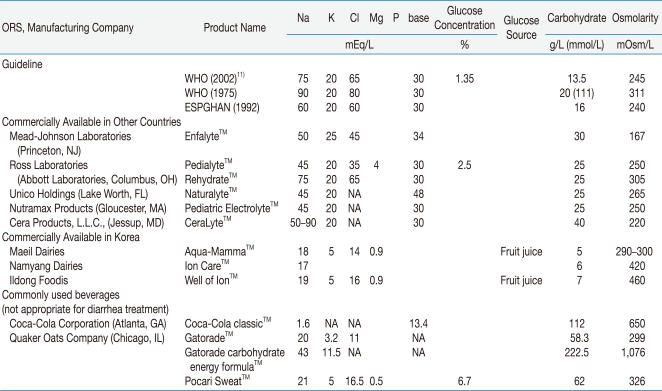1. Kosek M, Bern C, Guerrant RL. The global burden of diarrhoeal disease, as estimated from studies published between 1992 and 2000. Bull World Health Organ. 2003; 81:197–204. PMID:
12764516.
2. Santosham M, Chandran A, Fitzwater S, Fischer-Walker C, Baqui AH, Black R. Progress and barriers for the control of diarrhoeal disease. Lancet. 2010; 376:63–67. PMID:
20609988.

3. Duggan C, Fontaine O, Pierce NF, et al. Scientific rationale for a change in the composition of oral rehydration solution. JAMA. 2004; 291:2628–2631. PMID:
15173155.

4. Acra SA, Ghishan GK. Electrolyte fluxes in the gut and oral rehydration solutions. Pediatr Clin North Am. 1996; 43:433–449. PMID:
8614609.

5. Guarino A, Albano F, Guandalini S. Working Group on Acute Gastroenteritis. Oral rehydration: toward a real solution. J Pediatr Gastroenterol Nutr. 2001; 33(Suppl 2):S2–S12. PMID:
11698779.

6. Hirschhorn N, Kinzie JL, Sachar DB, et al. Decrease in net stool output in cholera during intestinal perfusion with glucose-containing solutions. N Engl J Med. 1968; 279:176–181. PMID:
4968807.

7. Field M. Intestinal ion transport and the pathophysiology of diarrhea. J Clin Invest. 2003; 111:931–943. PMID:
12671039.

8. Banks MR, Farthing MJ. Fluid and electrolyte transport in the small intestine. Curr Opin Gastroenterol. 2002; 18:176–181. PMID:
17033283.

9. Fonseca BK, Holdgate A, Craig JC. Enteral vs intravenous rehydration therapy for children with gastroenteritis: a meta-analysis of randomized controlled trials. Arch Pediatr Adolesc Med. 2004; 158:483–490. PMID:
15123483.
10. Hartling L, Bellemare S, Wiebe N, Russell K, Klassen TP, Craig W. Oral versus intravenous rehydration for treating dehydration due to gastroenteritis in children [online]. Cochrane Database Syst Rev. 2006; 3:CD004390. PMID:
16856044.
11. Water with sugar and salt. Lancet. 1978; 2:300–301. PMID:
79090.
12. Finberg L. The role of oral electrolyte-glucose solutions in hydration for children--international and domestic aspects. J Pediatr. 1980; 96:51–54. PMID:
7350314.

13. Farthing MJ. Studies of oral rehydration solutions in animal models. Clin Ther. 1990; 12(Suppl A):51–62. PMID:
2187612.
14. Hunt JB, Elliott EJ, Fairclough PD, Clark ML, Farthing MJ. Water and solute absorption from hypotonic glucose-electrolyte solutions in human jejunum. Gut. 1992; 33:479–483. PMID:
1582591.

15. Rautanen T, Kurki S, Vesikari T. Randomised double blind study of hypotonic oral rehydration solution in diarrhoea. Arch Dis Child. 1997; 76:272–274. PMID:
9135272.

16. Multicenter, randomized, double-blind clinical trial to evaluate the efficacy and safety of a reduced osmolarity oral rehydration salts solution in children with acute watery diarrhea. Pediatrics. 2001; 107:613–618. PMID:
11335732.
17. Hahn S, Kim Y, Garner P. Reduced osmolarity oral rehydration solution for treating dehydration due to diarrhoea in children: systematic review. BMJ. 2001; 323:81–85. PMID:
11451782.

18. Hahn S, Kim S, Garner P. Reduced osmolarity oral rehydration solution for treating dehydration caused by acute diarrhoea in children [online]. Cochrane Database Syst Rev. 2002; 1:CD002847. PMID:
11869639.
19. Atia AN, Buchman AL. Oral rehydration solutions in non-cholera diarrhea: a review. Am J Gastroenterol. 2009; 104:2596–2604. PMID:
19550407.

20. Molla AM, Ahmed SM, Greenough WB 3rd. Rice-based oral rehydration solution decreases the stool volume in acute diarrhoea. Bull World Health Organ. 1985; 63:751–756. PMID:
3910298.
21. Fontaine O, Gore SM, Pierce NF. Rice-based oral rehydration solution for treating diarrhoea [online]. Cochrane Database Syst Rev. 2000; 2:CD001264. PMID:
10796624.
22. Maulen-Radovan I, Gutierrez-Castrellon P, Hashem M, et al. Safety and efficacy of a premixed, rice-based oral rehydration solution. J Pediatr Gastroenterol Nutr. 2004; 38:159–163. PMID:
14734877.

23. Schultz SG. Sodium-coupled solute transport of small intestine: a status report. Am J Physiol. 1977; 233:E249–E254. PMID:
333947.

24. Gregorio GV, Gonzales ML, Dans LF, Martinez EG. Polymerbased oral rehydration solution for treating acute watery diarrhoea [online]. Cochrane Database Syst Rev. 2009; 2:CD006519. PMID:
19370638.
25. Hambidge KM. Zinc and diarrhea. Acta Paediatr Suppl. 1992; 381:82–86. PMID:
1421947.

26. Scrimgeour AG, Lukaski HC. Zinc and diarrheal disease: current status and future perspectives. Curr Opin Clin Nutr Metab Care. 2008; 11:711–717. PMID:
18827574.

27. Bhutta ZA, Black RE, Brown KH, et al. Zinc Investigators' Collaborative Group. Prevention of diarrhea and pneumonia by zinc supplementation in children in developing countries: pooled analysis of randomized controlled trials. J Pediatr. 1999; 135:689–697. PMID:
10586170.

28. Baqui AH, Zaman K, Persson LA, et al. Simultaneous weekly supplementation of iron and zinc is associated with lower morbidity due to diarrhea and acute lower respiratory infection in Bangladeshi infants. J Nutr. 2003; 133:4150–4157. PMID:
14652364.

29. Baqui AH, Black RE, El Arifeen S, et al. Effect of zinc supplementation started during diarrhoea on morbidity and mortality in Bangladeshi children: community randomised trial. BMJ. 2002; 325:1059. PMID:
12424162.

30. Lukacik M, Thomas RL, Aranda JV. A meta-analysis of the effects of oral zinc in the treatment of acute and persistent diarrhea. Pediatrics. 2008; 121:326–336. PMID:
18245424.

31. Spandorfer PR, Alessandrini EA, Joffe MD, Localio R, Shaw KN. Oral versus intravenous rehydration of moderately dehydrated children: a randomized, controlled trial. Pediatrics. 2005; 115:295–301. PMID:
15687435.

32. Cohen MB, Mezoff AG, Laney DW Jr, et al. Use of a single solution for oral rehydration and maintenance therapy of infants with diarrhea and mild to moderate dehydration. Pediatrics. 1995; 95:639–645. PMID:
7724298.

33. Freedman SB, Cho D, Boutis K, Stephens D, Schuh S. Assessing the palatability of oral rehydration solutions in school-aged children: a randomized crossover trial. Arch Pediatr Adolesc Med. 2010; 164:696–702. PMID:
20679159.






 PDF
PDF ePub
ePub Citation
Citation Print
Print


 XML Download
XML Download